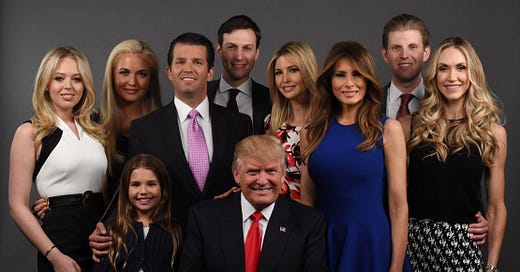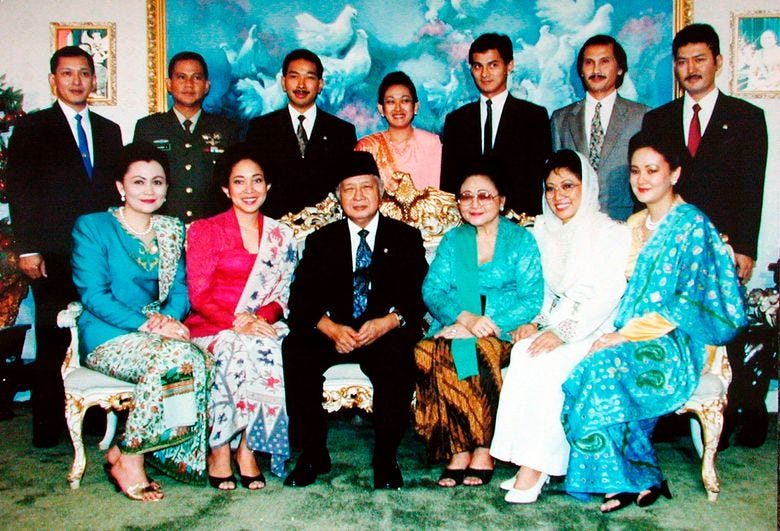Our Very Own Suharto
To find Trump-level corruption, you have to look at a developing-country kleptocracy from 30 years ago.
David Frum recently called Donald Trump’s Qatari airplane bribe “the most astonishing act of brazen corruption in the history of the American presidency — in the history of many post-Soviet presidencies… It can’t be compared to anything that has ever happened in American history.”
He’s right. To find something comparable we have to travel 10,000 miles eastward and 30 years backward to what Trump would consider a “shithole” country. There, we find the shamelessly kleptocratic Suharto clan, which ruled Indonesia for three decades until toppled by a popular revolt in 1998. By that time, the Suhartos were running what the German NGO Transparency International called the single most corrupt regime on earth, one that ultimately stole upwards of $35 billion.
President Suharto (many Javanese go by a single name) assumed power in 1967, and in succeeding years more or less governed by the corrupt-autocrat playbook. He established an elaborate system of patronage and absolute, personalized rule backed by the military; imposed an official state ideology (pancasila, or “five principles”); and placed family members in state positions ideal for extractive self-enrichment. Donald Trump must have been taking notes.
As an editor for the Hong Kong-based Far Economic Review in the 1990s, I had the perverse pleasure of acquainting myself with the routine, normalized corruption that came to define the Suharto family then and which today — I can’t believe I’m about to write this — defines America’s first family. In either case, it’s hard to say which is more striking, the colossal scale of the corruption or its sheer audacity.
It’s impossible here to provide a comprehensive accounting of the Suharto kleptocracy, but a few vignettes convey a sense of it.
Child’s play
For starters, Suharto’s six pampered nepo-children received lucrative monopolies over everything from toll roads to cinemas, and the family reportedly controlled 14,000 square miles of Indonesian real estate — about the size of Taiwan — including a million square feet of prime land in the capital, Jakarta.
Echoing Trump’s various pay-to-play schemes, more than a thousand domestic firms gifted shares to the Suharto family, which reportedly extracted a 10% stake in any foreign-owned venture. (First Lady Ibu Tien came to be known as “Madam Tien percent.”) By the end the family controlled or owned outright at least 564 companies.
Just before the regime’s collapse, Forbes estimated Suharto’s net worth at $16 billion, despite his peak annual salary of $21,000. The World Bank estimated government-wide corruption consumed as much as 30% of Indonesia’s development budget.
Another Trumpian rhyme: The NGO Indonesian Corruption Watch reported that Suharto companies likely never paid more than 10% of their tax obligations.
State institutions became instruments of enrichment for family and cronies. Suharto allowed a close associate and former general, Ibnu Sutowo, to run state oil conglomerate Pertamina as his private company, until Sutowo almost bankrupted it in 1975. That opened a new lane for family avarice. Pertamina’s oil trade was subsequently and unnecessarily conducted through two small companies controlled by Suharto sons Tommy and Bambang, which together raked in commissions of more than $50 million a year.
Suharto also created a network of charitable organizations, called yayasan — run by the military and Suharto family members — which extracted “donations” in exchange for government support and required permits. Much of it went into a slush fund that rewarded political allies.
If this rings a Trump-shaped bell, it may be because in 2019 a New York state judge ordered Trump to pay $2 million to several charities as a penalty for misusing his own charitable foundation for political and business advantages. (One charitable cause the Trump Foundation funded was a $10,000, six-foot portrait of — Donald Trump).
Sweet deal
I don’t know why, but the scam that most set me off was Suharto’s national-car project. The government had for years required domestic car makers to jump through local-content and other hoops, and then in 1996 suddenly announced that it would produce an indigenous Indonesian car in a joint venture with South Korea’s Kia, exempt from the demands made of other local producers. By a remarkable coincidence, the project ended up in the hands of presidential son Tommy Suharto, who had no experience making cars. He also had no factory, so he was allowed simply to import Kia models at duty-free prices that undercut the incensed competition. The scheme ultimately collapsed amid Asia’s 1998 financial crisis.
A foreign investor speaking to BusinessWeek in the late ‘90s described the Suharto operation as “institutionalized theft.” That phrase nicely fits the Trump junta as well, with an overlay of institutionalized impunity. The president controls the means by which any federal prosecution would take place, and can use his pardon power with Suharto-like favoritism.
The Suhartos were overthrown in an orgy of violence prompted partly by Asia’s economic collapse, which finally tipped whatever balance had sustained the regime for so long. But, like the Trumps, they demonstrated a Houdini-esque talent for escaping legal consequences. Only Tommy ever did prison time, and that was for orchestrating the 2001 murder of a judge. He was sentenced to 15 years and served four.
The difference between the U.S. and Indonesia, of course, is that the people abused by the Suhartos felt little entitlement to good governance, and the regime felt no obligation to provide it. Neither is supposed to be true in this country, but given last week’s parade of craven favor seekers debasing themselves to dine with the Great Orange Sultan, one can no longer be sure. We seem to have arrived at a place where what a corporate executive said of Suharto’s Indonesia is also true of Trump’s America: “If you don’t pay bribes, people think you’re odd.”






Thanks. We all need relevant history. All this present crap is new to most Americans.